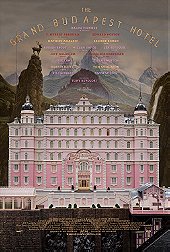Comparing Wes Anderson’s films to a Swiss Watch is an accurate comparison, but that gives a false impression of his films as mechanical and cold. On the contrary, Anderson’s films spark with a wit and stylization that is at once like a storybook and a monument to artistic stuffiness and singularity of vision. With each subsequent film, Anderson is refining his style, loading up his stories with gags, star cameos, subdued emotions, and playful artifice. The Grand Budapest Hotel might just be the apex of this work thus far.
Grand Budapest is a memory play, one fraught with strange plot twists and Anderson’s unique brand of precociousness. Told from the perspective of Zero Moustafa (F. Murray Abraham as an elderly man and newcomer Tony Revolori as a young man), The Grand Budapest Hotel details the events leading to Moustafa going from lobby boy to owner of the decaying hotel. The story includes a murder mystery, a priceless work of art, and a heavy gloss of farcical whimsy.
The hotel remains a towering monument reminder of Europe’s prewar Belle Epoque, and plays an elegy to that long lost period. The film takes us back to a period in time when the service industry wasn’t frowned upon, and no other character more perfectly personifies this idea than Gustav H (Ralph Fiennes), the former concierge. Gustav is an effete man who entertains wealthy patrons to keep his high-class aspirations and lifestyle in check. He doesn’t just perform his duties, he feels a deep connection and responsibility to them. The comfort and adoration of his guests and staff isn’t just a piece of corporate jargon for him, but a lifelong dream and tremendous source of pride.
When one of his favorite clients (Tilda Swinton, in an amusing cameo) turns up dead, Gustav discovers he’s the recipient of an incredibly valuable painting. Her son (Adrien Brody, snarling and amoral) tries to pin her mysterious death on Gustav and reclaim the painting, and what transpires is equal parts Ernst Lubitsch fantasia and James Bond-style action set pieces and intrigue. And it winds up being a little sad about the passage of time, how the sweet innocence of this time is about to be eradicated by the rolling storm of WWII. But Grand Budapest is still mostly funny.
Anderson is known for getting great work from his actors, and no one shines brighter in this than Fiennes. Has he been secretly hiding his gifts as a comedic actor for any particular reason? He shines brightly here, turning up a memorable performance that should get him awards season contention if there’s any justice, but we’ve still got a long way to go before nominations for that begin. Anderson regulars Brody, Willen Dafoe, Bill Murray, Edward Norton, Jason Schwartzman, Jeff Goldblum, and Swinton all turn in fine work, much of it in smaller character parts. Abraham mostly shares scenes with Jude Law, and they have a nice back-and-forth and do well with what they are given. Tom Wilkinson, Mathieu Amalric, Saoirse Ronan, and Lea Seydoux all make appearances, not given too much to do, but adding their distinct charms to the overall effect.
But much of the film rests on Tony Revolori, and he gives a great deadpan performance. He must go from wide-eyed youth in awe of Gustav to his protégé and end up as the proactive hero of the story. Revolori must assail the various cameos and plot twists, helping Anderson keep the numerous plot strands working in perfect harmony. It’s a lot to ask of a young actor to hold his own against actors of Ronan and Fiennes caliber, but Revolori does an admirable job.
The Grand Budapest Hotel sounds like many plates spinning in the air, but Anderson makes sure they never waver or falter. Anderson finds a great rhythm that makes the entire story come together and continually move at a great energy. We’ve come to expect a certain matter of farce, melancholy and whimsy with Anderson, and he doesn’t disappoint. Yet here he is adding new layers to his oeuvre by trying to do some action, unapologetic romanticism and he does both supremely well. But did I mention the frantic humor, and that Grand Budapest is a charming comedy?
 Login
Login